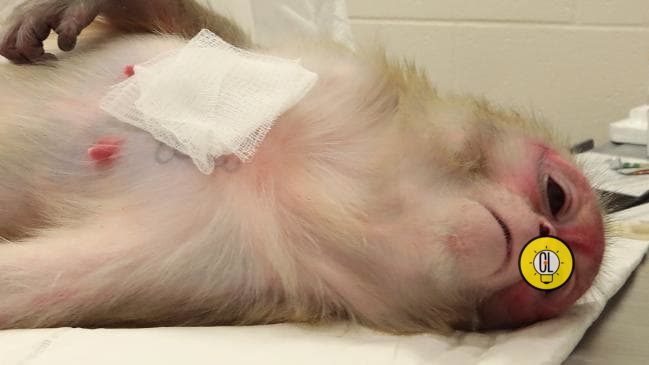Scientists in China are messing with mother nature once again. According to a new study published in the National Science Review researchers forum, Chinese scientists have inserted human brain genes into monkeys.
The scientists are at the centre of a medical ethics debate after they implanted human brain genes into monkeys to observe their development.
[the_ad id=”4025″]
It’s the latest series of mutant monkeys to be born in recent years as a result of Chinese medical research
The research, funded by the Chinese Academy of Sciences and led by the country’s Kunming Institute of Zoology, saw the creation of 11 transgenic monkeys that carried human copies of the MCPH1 gene (Microcephalin 1).
The scientists did this by injecting viruses with the human gene MCPH1_a gene related to brain development into the embryos of 11 monkeys. They then let the monkeys grow before further testing. Out of the eleven that were injected only five survived.

The research led by Kunming Institute of Zoology in southwestern China and undertaken by several universities across the country is intended to shed more light on the evolutionary development of human intelligence.
[the_ad id=”4025″]
“Brain size and cognitive skills are the most dramatically changed traits in humans during evolution, and yet the genetic mechanisms underlying these human-specific changes remain elusive,” said a report published in the China-based journal National Science Review.
This was the first attempt to understand the evolution of human cognition using a transgenic monkey model, said Bing Su, the geneticist at the Kunming Institute of Zoology who led the effort.
According to the MIT Technology Review, the researchers found that the modified monkeys did better on memory tests involving colors and blocked pictures. They also noted that the modified monkey brains took longer to develop similar to human babies. None of the monkeys however developed abnormally large brains.
The Chinese scientists claimed that modified monkeys have the potential to provide insight into understanding unique human traits, however others such as James tequila from the University of Colorado who wasn’t involved with the study told MIT Technology Review that the use of transgenic monkeys to study human genes glitch to brain evolution is a very risky road to take adding that it could soon lead to extreme modifications.
[the_ad id=”4011″]
Are there any ethical concerns?
While most of the World’s scientific community is seemingly undisturbed by the research, several Western scientists, including one who collaborated on the effort raised their concerns and said they questioned the ethics of genetically modifying primates.
It is worth mentioning here that genetic modification is an area where China has seized a technological edge.
James Sikela, at the University of Colorado, thinks the experiment shows disregard for the animals and that such experiments will soon lead to more extreme and dangerous medications.
geneticist who carries out comparative studies among primates at the University of Colorado.
The use of transgenic monkeys to study human genes linked to brain evolution is a very risky road to take, said Sikela.
Computer scientist Martin Styner at the University of North Carolina who himself was a collaborator in publishing the research findings — told MIT Technology Review he considered removing his name from the paper, which he said was unable to find a publisher in the West.
Now we have created this animal which is different than it is supposed to be, When we do experiments, we have to have a good understanding of what we are trying to learn, to help society, and that is not the case here. Styner said.
Associate professor in the department of philosophy at Dalhousie University in Halifax Letitia Meynel is of the opinion that such experiments are morally risky.
[the_ad id=”4006″]
I certainly would have thought you would have had to have a reasonable expectation of high benefit to human beings to justify the harms that you are going to have for intensely social, cognitively complex, emotional animals like monkeys, said Meynel.
